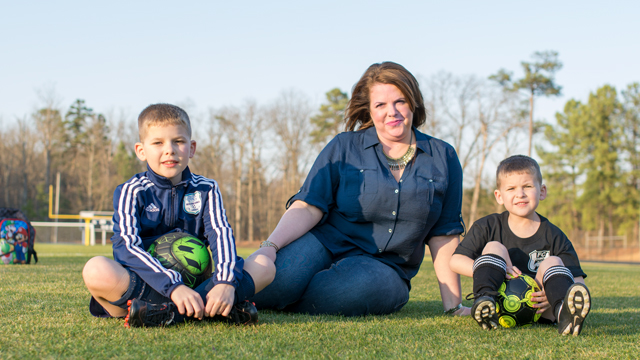The minute the kids step off the bus, do you usher them into your minivan at light-year speed? Is that same van stocked with more pretzels and Gatorade than a 7-Eleven? After soccer practice, you jet over to cello lessons. There’s a project due tomorrow that your middle-schooler (and yes, you!) forgot about. A glue gun may be involved. An argument breaks out. Your 16-year-old starts talking about a part-time job, and wouldn’t it be better if he had his own car? Definitely not a lame minivan. No one has cracked a metaphorical school book yet, and it’s almost eight o’clock.
Forget dinner!
Many parents want the best for their children, and in turn, sign them up for enrichment not provided in a classroom. But when homework is left undone and grades plummet, or stress reaches catastrophic levels, it is either time to tweak organizational methods to include homework, or reevaluate activity scheduling. The argument against copious amounts of out-of-school work is steadfast, and hopefully one day will be streamlined. Still, there will always be some sort of study involved for school.
Here are a few tips on balancing after-school activities and homework, cultivated from my experience as a mom of two boys playing competitive soccer four to six days a week.
1. If you have a little time.
Let your child decompress from the hubbub of school. Don’t turn on the television. Don’t do homework right away. My kids are starving when they come home from school (regardless of a school snack), and it’s pointless to start homework with low brain power. Pick a snack that combines carbs and a protein such as nuts, pita chips and cheese, or crackers and hummus. If they’re picky eaters, choose what you know they’ll eat without a fuss. Try to make it healthy. Reduce sugary drinks. My boys can’t tolerate Red Dye No. 40, which is known to cause hyperactivity, (the last thing we need when trying to focus) so I cut out any drinks with that additive. Have a food dawdler? Set a timer for fifteen minutes to finish a snack. Have your child complete homework after his snack. The day’s lesson is fresh in his mind. Go ahead and get it done. Score!
2. If you have no time.
Already in the car? Lower the radio. Pack snacks like the ones listed above. Crumbs between the seats are inevitable. Knock out portable tasks – like reading or studying vocab – if you have an older child. (Reading aloud to children of all ages is still important, so save additional story time for before bed.) My 9-year-old will even do worksheets on his 15-minute bus ride. Don’t forget to check any work done en route for errors and sloppiness.
Have a younger child complete their homework at another sibling’s lesson while they wait and vice versa. If homework absolutely cannot be completed before activities and it is late, have your child study as soon as they get home. Sometimes this may mean a working-dinner.
 Oh, yeah, dinner! That topic is for a whole other article, but know that quick, small-ingredient-count recipes are readily available online. I like EatingWell.com and CookingLight.com. Crock-Pot meals are the best, and if you follow CrockinGirls.com, or simply Google a quick recipe, a whole meal can be waiting for your busy family at home. If you eat out, think about healthy options. And oh yes, those heat-and-serve dinners at grocery stores have vastly improved in taste and choices.
Oh, yeah, dinner! That topic is for a whole other article, but know that quick, small-ingredient-count recipes are readily available online. I like EatingWell.com and CookingLight.com. Crock-Pot meals are the best, and if you follow CrockinGirls.com, or simply Google a quick recipe, a whole meal can be waiting for your busy family at home. If you eat out, think about healthy options. And oh yes, those heat-and-serve dinners at grocery stores have vastly improved in taste and choices.
3. When it’s not working.
There are tears at night when three subjects need to be completed, and your kid is exhausted from a packed day. You’re called “mean,” or worse, for making them put down the iPad to finish algebra. The time is beyond late. Yes, they need a shower afterwards. (Why do they always ask? Can’t they smell themselves?)
Report cards arrive with failing (or less than stellar) grades. Your child is frustrated because they’re trying to do it all, or striving for a standard they cannot reach under the current schedule. Pay attention to your child’s stress levels (and your own). Activities and enrichments are fun, but not piled on hour after hour. Maybe a couple times a week is even too much. Scale back to what restores harmony for your family. Education should be the last element edged out of your weekly schedule.
Maybe they complain about how much they hate dance every time you’re driving to a lesson. Why are you even doing this? Don’t live vicariously through your kids. Let them pick their own recreation. They’ll actually enjoy the activities you spend money and time on. What a concept! I’ve tried for years to interest my boys in art classes or to pick up an instrument, with no-go results. They’re into math, science, engineering, and sports. Accept the child in front of you!
For high schoolers, gauge how much they can handle. Grades and placement become a snapshot of the entire student profile in college applications. Juggling swim team, show choir, and an after-school job builds character, but bad grades – even if a schedule is rigorous – can sink future education opportunities. Something’s got to give. Team up to work with teachers of challenging subjects and the guidance counselor to construct a plan to veer your student back on track, but make sure your student ultimately owns this process. This may mean eliminating activities that are superfluous and don’t contribute to education (aren’t parents always the villains?). The change doesn’t have to be permanent. If the kinks are worked out with your student’s grades, and everyone feels confident three-to-six months down the road, pick up one of the activities again.
Parents have a responsibility to set their children on a course to success. After all, isn’t that the goal: to raise a dynamic member of society? One who can handle adversity and forge ahead to solve his or her own problems? Balance after-school activities with essential studies to create a well-rounded young person. Know when to pare down commitments. Know when to say ciao to the cello!





